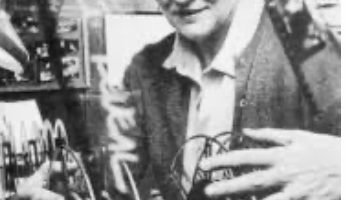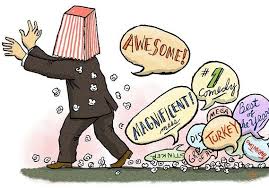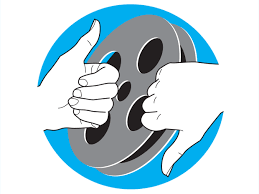You turned down backstage passes, our friends asked? Are you CRAZY?
Read More
Mystery Guest


You turned down backstage passes, our friends asked? Are you CRAZY?
Read More

My Aunt, Dede Allen
I’ve always been very proud of my aunt Dede Allen. Movie buffs may know her as a stellar film editor and a pioneer in what had been a male-dominated craft.
Dede worked her way up in the film business, starting as a production runner at Columbia Pictures, then editing commercial and industrial films and eventually becoming a feature film editor where her unusual talent was recognized by other editors and directors. And Dede pioneered the very effective use of audio overlaps where dialog or voice-over narrative continue after a scene change, and also introduced emotional jump cuts to add energy and realism to a film’s characters.
Classic films edited by my aunt include The Hustler, Bonnie and Clyde, Dog Day Afternoon and Reds, and directors she worked with include Arthur Penn, Sidney Lumet, Robert Wise, Elia Kazan and George Roy Hill. And among other honors, Dede served on the Board of the Academy of Motion Picture Arts and Sciences.
Dede’s husband Stephen Fleischman was prominent in a related field as a writer and producer of documentary films, and he and I shared a birthday! (See Birthday Calendar)
And their son Tom Fleischman is an acclaimed sound editor. Sadly Dede and Steve didn’t live to join their daughter Ramey Ward and the rest of our family to see Tom win the Oscar for his work on the 2012 film Hugo. (See The Irishman)
But over the years we were all there to see Dede honored on both coasts for her achievements and her own Oscar nominations. At those dinners it was fun to rub elbows with the likes of Warren Beatty and other celebs Dede had worked with.
But more thrilling was hearing Dede speak passionately about her craft and her role in the making of some great films!
– Dana Susan Lehrman

I never asked to be a movie critic. And yet it happened. People don’t believe me when I say this; they assume movie reviewing is such a plum job that I must have scrambled and hustled to get there. Not really.
In 1991 I’d been working at the San Francisco Chronicle seven years when the senior movie critic Judy Stone took a buyout offer and retired. In a crisp email, the assistant managing editor informed me I would forthwith be reporting full-time as a movie critic. There wasn’t any “Come in to my office to discuss…” conversation. No “How would you feel about doing this…?”
I was the logical choice, given that I’d been pinch-hitting for Judy when she was out sick or on vacation. Plus, I’d previously reviewed films for the San Francisco Bay Guardian, an alternative weekly. That job also came unbidden: I got it because my neighbor at the time was the arts editor and had a hunch I could do it.
Even though I had a lifelong love of movies, and a deep trove of cinema trivia in my head, I never thought I’d be a critic. I figured my take on movies was too idiosyncratic, too personal and off-the-mainstream. I later realized that every film critic is idiosyncratic — that taste and aesthetics are by definition deeply personal. If a critic writes safe, generalized pabulum that doesn’t spring from a strongly impassioned point of view, then you’ve got a problem.
For the next 12 years I reviewed movies full-time in addition to writing features and profiles on movie personalities. I saw between 200 and 250 movies per year, and wrote up to five reviews and feature stories per week. I got to meet Catherine Deneuve, Lillian Gish, Stephen Spielberg, Lucille Ball, Gregory Peck, Pedro Almodovar, Clint Eastwood, Laura Dern and hundreds more. I went to film festivals in Toronto, Sundance, Telluride, and Hong Kong. I had the privilege of championing artists like Krzysztof Kieslowski and Satyajit Ray, whose work might otherwise go unnoticed because their distributors had tiny advertising budgets; and I got to discover Oscar-winning filmmakers like Alexander Payne (Sideways, The Descendants) and Steven Soderbergh (sex, lies, and videtape; Erin Brockovich) as their careers were just starting.
Being a movie critic brought me a minor level of fame in the Chronicle’s circulation area — at least among the people who read movie reviews — and a feel for the privileges and annoyances of being a public person. I was gratified when someone said, “You’re my favorite critic” or “I saw that movie you recommended and loved it.” It was fun to see my name quoted in a movie trailer, and then hear from a cousin back East or an old college friend who also saw the trailer. Who doesn’t like an ego boost? I enjoyed the dialogue with readers and the fringe benefits — like getting choice seats and not waiting in long lines; like getting comped for concerts and plays; like having my phone calls answered quickly. You can get spoiled that way, and I did.
Being semi-famous wasn’t always fun. When email became the standard communication mode in the early ‘90s, the feedback I received tripled or quadrupled. Some correspondents were kind and thoughtful; a lot were not. I learned that anger, not satisfaction or admiration, is the single greatest incentive when writing to a total stranger. Think about it: How often do you contact your utility company and enthuse, “Wow, the heat feels great on this blustery day. Thank you!”?
 One day a fellow reviewer at the Chronicle asked me, “Are you getting a lot more hate mail now that everyone’s doing email?” I was. “You owe me the $10 I wasted on that piece of crap!” was a grumble I received more than once. Or, “Are you sure you saw the same movie I saw?” Or this lulu: “It is clear in the last analysis that the only thing coursing through the mind and pen of Edward Guthmann is viciousness of the lowest sort.” At least he could string a sentence together.
One day a fellow reviewer at the Chronicle asked me, “Are you getting a lot more hate mail now that everyone’s doing email?” I was. “You owe me the $10 I wasted on that piece of crap!” was a grumble I received more than once. Or, “Are you sure you saw the same movie I saw?” Or this lulu: “It is clear in the last analysis that the only thing coursing through the mind and pen of Edward Guthmann is viciousness of the lowest sort.” At least he could string a sentence together.
One hater used to cut my reviews from the paper, deface them with a large rubber stamp saying “BULLSHIT” and mail them back to me. (He did that with other critics, I learned.) People take movies personally and if you criticize something that touched them or reinforced their identity, they feel you’ve violated their entire being. Occasionally I got nasty phone calls at home — always anonymous. A colleague introduced me to a friend once who said, “I always know I won’t like a movie if you do.” How the hell do you answer that?
 Once you’re semi-famous, you’re fair game. At a preview screening I was photographed kamikaze-style from three feet away by the since-deposed editor of a San Francisco literary journal. He hated something I’d written. “You might ask first before you photograph someone,” I said. “Ohhh, would the Chronicle?” he sneered. The next day, he posted the photo online and claimed I “lashed out” at him when he took the picture.
Once you’re semi-famous, you’re fair game. At a preview screening I was photographed kamikaze-style from three feet away by the since-deposed editor of a San Francisco literary journal. He hated something I’d written. “You might ask first before you photograph someone,” I said. “Ohhh, would the Chronicle?” he sneered. The next day, he posted the photo online and claimed I “lashed out” at him when he took the picture.
In October 2003 I wrote my last review, asked to be reassigned, and started writing author interviews and a variety of profiles. I bailed because my assignment editor was intolerable (a very long story), but as soon as I quit I realized how much I’d come to dislike the reviewer grind itself. Had the movies all been stellar, I might not have minded, but many were awful — and often in the same way that movies from the previous week were awful. I sometimes felt like I was justifying the stinkers by giving them any attention at all.
Suddenly my evenings were free. Slowly, I could recapture the original love of movies I developed as a 7-year-old watching Fred Astaire and The Wizard of Oz on TV. In that first year after quitting, I saw only one or two movies a month instead of four or five a week I didn’t have to sit through soul-destroying bilge to the bitter end. I only saw the movies I wanted to see, and if I was bored I got up and walked out. I was liberated! Like a frog in a pot of water that slowly comes to a boil, I hadn’t realized how accustomed I’d become to stress, discomfort and a begrudging sense of duty.
At the same time, I knew I was surrendering a kind of cachet and name recognition, that I would miss the communication with my readers and the cushy, glamorous aspects of the job. I felt a pang of regret that my 12-year-old nephew, who liked having a movie critic for an uncle, would lose his bragging rights and be disappointed for himself and for me. But I don’t regret my decision: I regained an ease and comfort in my life.
Most of the writing I do now is personal, and my relationship with movies has never been better. During Covid, I watched Turner Classic Movies and streamed new titles regularly. I found that old favorites have a new dimension, a new fascination. Having lived more, I appreciate them on different and deeper levels. I’m falling in love all over again.

Ghostwriting in the Family
When I was in high school I don’t remember anyone making a big fuss over college admissions. In fact what I remember most about senior year was shopping for my college wardrobe with my mother, walking around Greenwich Village with my friends, and slow dancing to 50s rock ‘n’ roll in friends’ houses when their parents weren’t home. And I certainly don’t remember writing my college essay, because in fact my father wrote it for me.
I don’t remember why he did, I guess I was too busy trying on clothes at Loehmann’s, wandering around the Village, or dancing to the Platters.
My dad went to NYU Heights and loved it, and he was sure I would too, and so he sat down one night and wrote my essay. I think the gist of the essay was, “My dad went to NYU Heights and loved it, and I’m sure I will too.”
Well, it must have done the trick because I got in, and of course I did love it, and not for a minute did I feel guilty about that ghost-written essay.
In 1973, nine years after I graduated, New York University closed its arts and engineering schools at the Heights and sold the buildings and grounds to CUNY. And so my old alma mater became the new leafy campus of Bronx Community College.
I guess some things must change.
Years later when my son was too busy studying his own Torah portion, my husband sat down one night and ghost-wrote the kid’s bar mitzvah speech.
I guess some things never change.
– Dana Susan Lehrman